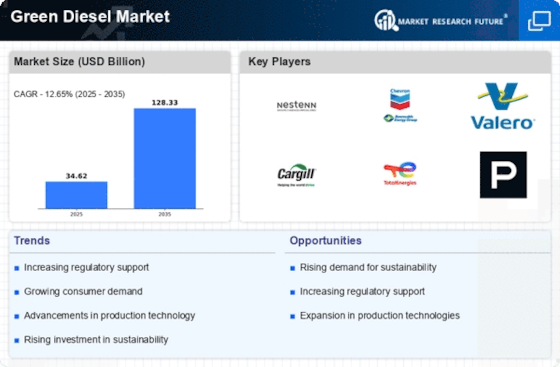Top Industry Leaders in the Green Diesel Market

*Disclaimer: List of key companies in no particular order
Top listed companies in the Green Diesel industry are:
Neste Oyj (Finland)
NX100 Green Diesel & Lubricants (India)
Chevron Corporation (US)
Valero Energy Corporation (US)
Gevo, Inc. (US)
Phillips 66 (US)
Marathon Petroleum Corporation (US)
Aemetis, Inc. (US)
Global Clean Energy Holdings, Inc. (US)
Shell Plc (UK)
PBF Energy Inc. (US)
Honeywell International Inc. (US)
Eni (Italy)
Greening the Road: Exploring the Competitive Landscape of the Green Diesel Market
Beneath the rumble of engines transitioning to a cleaner future, a dynamic market hums with activity - the green diesel market. This multi-billion dollar space pulsates with competition, as established players, agile innovators, and regional specialists vie for a share in the technology that reduces our reliance on fossil fuels. Let's navigate the key strategies, market dynamics, and future trends shaping this crucial landscape.
Key Player Strategies:
Global Titans: Companies like BP, Shell, and Neste leverage their extensive experience, diverse production capacities, and global reach to maintain their dominance. They cater to major fuel distributors and transportation fleets, offering green diesel made from renewable feedstocks like plant oils or waste biomass. Neste's NEXBTL renewable diesel exemplifies their focus on high-performance and sustainable production.
Technology Disruptors: Startups like Diamond Green Diesel and REG are disrupting the market with innovative feedstocks like algae oil and wood waste, reducing the reliance on traditional agricultural sources. They cater to environmentally conscious clients seeking carbon-neutral options, offering green diesel with lower lifecycle emissions. Diamond Green Diesel's Biodiesel from Algae exemplifies their focus on unconventional and sustainable feedstocks.
Cost-Effective Challengers: Chinese manufacturers like Sinopec and PetroChina are making waves with competitively priced green diesel, targeting cost-sensitive markets in developing countries. They focus on affordability and basic functionality, offering alternatives to premium brands. Sinopec's Green D+ diesel demonstrates their focus on cost-effective green fuel solutions.
Regional Specialists: Companies like Emerald BioFuels and BlueGreen Fuels excel in specific segments like biodiesel production from regional crops or green diesel for marine applications. They leverage their deep understanding of local feedstocks and regulations, offering tailored solutions for niche markets. BlueGreen Fuels' renewable diesel from marine biomass showcases their focus on regional feedstock utilization.
Factors for Market Share Analysis:
Feedstock Source and Sustainability: Utilizing waste-based or non-food crop feedstocks, minimizing land-use change and deforestation, and adhering to certified sustainability standards attracts environmentally conscious consumers and regulatory benefits. Companies with transparent and sustainable feedstock sourcing gain an edge.
Production Efficiency and Cost: Optimizing production processes, achieving cost parity with fossil diesel, and offering price incentives for early adopters are crucial for mass adoption. Companies with efficient and cost-competitive green diesel production stand out.
Performance and Compatibility: Ensuring engine compatibility, maintaining high energy density and performance, and offering blends with varying green diesel content caters to diverse needs of transportation sectors. Companies with high-performance and adaptable green diesel solutions gain market share.
Government Policies and Incentives: Adherence to regional regulations, leveraging renewable fuel mandates and carbon credit programs, and collaborating with government initiatives attracts public and private investments. Companies actively engaging with policy landscapes gain an edge.
New and Emerging Trends:
Focus on Advanced Renewable Feedstocks: Developing green diesel from hydrogen and air capture, utilizing microbial technologies for feedstock conversion, and exploring circular economy approaches using waste plastics present significant growth opportunities. Companies leading in advanced feedstock research stand out.
Integration with Biorefineries and Biomass Processing: Expanding production through integrated biorefineries, optimizing biomass pretreatment and conversion processes, and minimizing waste generation attract resource-efficient investors and contribute to sustainability goals. Companies with integrated and efficient production infrastructure gain an edge.
Focus on Blending and Infrastructure Adaptation: Developing optimal green diesel blends for specific engine types, advocating for infrastructure upgrades like dedicated storage and distribution networks, and collaborating with fuel retailers play a crucial role in market penetration. Companies actively involved in market expansion efforts stand out.
Regional Customization and Regulation Compliance: Adapting production processes and feedstocks to regional availability and regulations, ensuring compliance with emission standards, and developing tailored solutions for specific transportation sectors attract local stakeholders and regulators. Companies with strong regional customization capabilities gain market share.
Overall Competitive Scenario:
The green diesel market is a dynamic and complex space with diverse players employing varied strategies. Established giants leverage their resources and global reach, while technology disruptors introduce innovative feedstocks and production methods. Cost-effective challengers cater to budget-conscious buyers, and regional specialists excel in niche markets. Factors like feedstock sustainability, cost competitiveness, performance, and policy support play a crucial role in market share analysis. New trends like advanced feedstocks, integrated biorefineries, blending solutions, and regional customization offer exciting growth opportunities. To succeed in this evolving landscape, players must prioritize sustainability, cost efficiency, performance improvement, and proactive engagement with policy and infrastructure development. By greening the road with innovation, adaptability, and a responsible approach, they can secure a dominant position in this vital market.
Latest Company Updates:
Neste Oyj (Finland):
- Date: Dec 12, 2023 (Source: Neste press release)
- Development: Announced a partnership with SkyNRG to supply Neste MY Sustainable Aviation Fuel (SAF) to airlines at Amsterdam Schiphol Airport.
NX100 Green Diesel & Lubricants (India):
- Date: Oct 20, 2023 (Source: NX100 website)
- Development: Announced plans to invest ₹1,000 crore (US$122 million) to expand its green diesel production capacity in India.
Chevron Corporation (US):
- Date: Dec 5, 2023 (Source: Chevron press release)
- Development: Announced a partnership with Bioenergy DevCo to produce renewable diesel from algae at its Richmond, California, refinery.
Valero Energy Corporation (US):
- Date: Dec 15, 2023 (Source: Valero press release)
• Development: Announced plans to build a renewable diesel production facility at its St. Charles, Louisiana, refinery by 2026.










